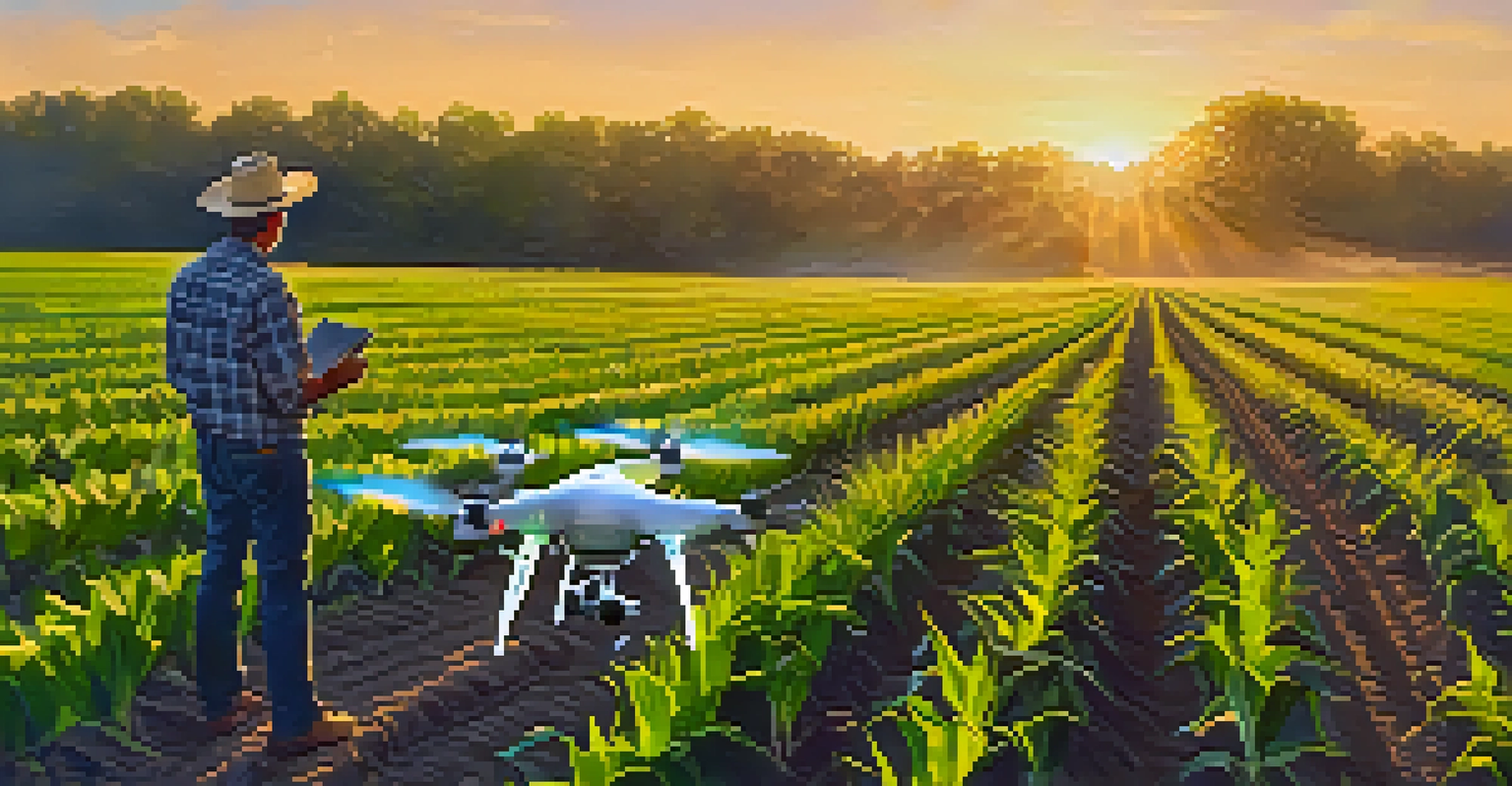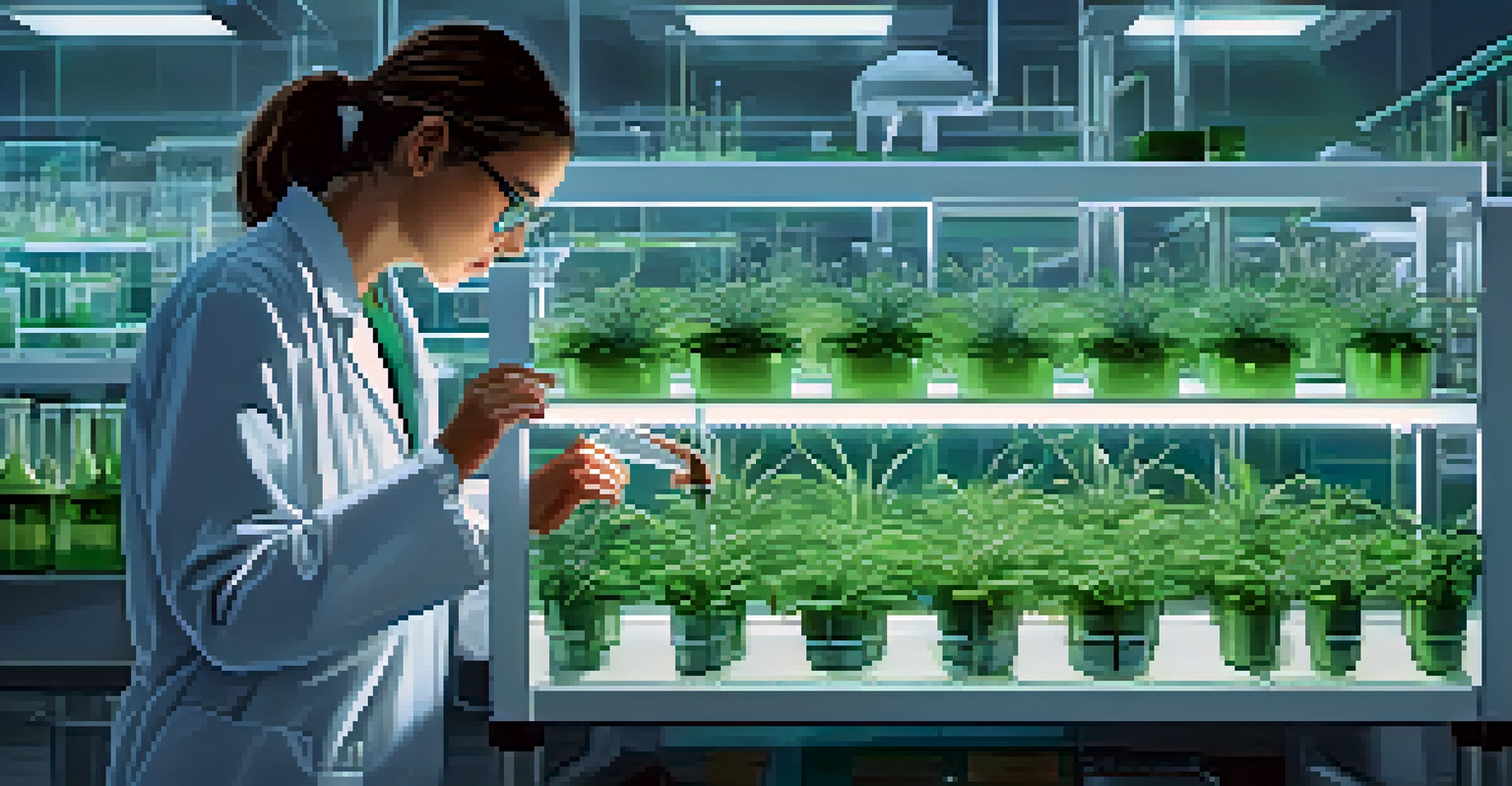The Future of Plant Biotechnology: Innovations on the Horizon

Understanding Plant Biotechnology and Its Importance
Plant biotechnology refers to a set of techniques that use living plants to create products or improve plant traits. This field has transformed agriculture by enabling the development of crops that are more resistant to pests, diseases, and environmental stresses. With the growing global population and climate change challenges, the importance of these innovations cannot be overstated.
Biotechnology may be the most important tool we have to feed the world and protect the environment.
By enhancing crop yields and nutritional value, plant biotechnology plays a crucial role in food security. For instance, genetically modified organisms (GMOs) have been instrumental in producing crops that require fewer resources while delivering higher outputs. This efficiency not only benefits farmers but also supports sustainable farming practices.
As we look to the future, the potential of plant biotechnology extends beyond traditional applications. Emerging technologies promise to revolutionize how we approach agriculture, making it essential for us to understand and embrace these advancements for a sustainable future.
Gene Editing: CRISPR and Its Implications
One of the most exciting advancements in plant biotechnology is gene editing, particularly using CRISPR technology. This method allows scientists to make precise changes in a plant's DNA, enabling the development of crops with desirable traits without introducing foreign genes. It's akin to editing a document to improve clarity; you're refining what already exists.

CRISPR has already shown promising results in creating drought-resistant plants and crops with enhanced nutritional profiles. For example, researchers have successfully used CRISPR to enhance the iron content in rice, addressing nutritional deficiencies in many populations. This potential to tackle global issues makes CRISPR a game-changer in the agricultural sector.
Plant Biotechnology Enhances Food Security
By developing crops that are more resilient and require fewer resources, plant biotechnology plays a vital role in ensuring global food security.
However, as with any technology, the use of CRISPR in plant biotechnology raises ethical questions and regulatory challenges. Balancing innovation with public acceptance and environmental safety will be crucial as we move forward with these powerful tools.
Sustainable Practices: Biotechnology for Eco-Friendly Farming
Sustainability is at the forefront of modern agriculture, and plant biotechnology plays a key role in promoting eco-friendly practices. By developing crops that require fewer pesticides or fertilizers, biotechnology helps reduce the environmental impact of farming. Think of it as creating a garden that thrives with minimal intervention, preserving natural resources.
The future of food is in biotechnology, and it is about feeding the world sustainably.
Innovative approaches like biopesticides and biofertilizers are emerging from this field, offering alternatives to chemical inputs. These biological solutions utilize natural organisms to manage pests and improve soil health, creating a more balanced ecosystem. This shift not only benefits the environment but also supports farmers looking for sustainable options.
As we continue to face climate change and resource depletion, integrating biotechnology with sustainable practices will be essential. The collaboration between scientists and farmers can lead to a new era of agriculture that respects the planet while meeting food production needs.
Precision Agriculture: Data-Driven Approaches
Precision agriculture is revolutionizing the way we cultivate crops by using data to inform decisions. By leveraging technologies like GPS, drones, and sensors, farmers can monitor their fields in real-time, ensuring optimal conditions for plant growth. This approach mirrors how we use navigation systems to find the best route; it helps farmers maximize efficiency and productivity.
In conjunction with plant biotechnology, precision agriculture allows for targeted interventions that can drastically improve crop performance. For example, by analyzing soil health and moisture levels, farmers can apply fertilizers or water only where needed, reducing waste and enhancing yields. This data-driven methodology not only boosts productivity but also promotes sustainable resource use.
CRISPR Revolutionizes Crop Development
The CRISPR gene-editing technology allows for precise modifications in plants, significantly improving traits like drought resistance and nutritional value.
As technology continues to evolve, the fusion of precision agriculture with plant biotechnology will pave the way for smarter farming practices. The future holds the promise of increased efficiency and sustainability, ensuring that we can produce food without compromising the health of our planet.
The Role of Artificial Intelligence in Plant Biotechnology
Artificial intelligence (AI) is making waves in the field of plant biotechnology, offering insights that were previously unimaginable. By analyzing vast amounts of data, AI can help identify patterns and predict outcomes, enhancing the development of new crop varieties. It's similar to having a knowledgeable friend who can guide you through complex decisions with ease.
For instance, AI can assist in screening for desirable traits in plants, speeding up the breeding process significantly. This capability allows scientists to focus on the most promising candidates, reducing the time and resources needed to develop new varieties. As a result, we can expect to see faster advancements in crop improvement.
Moreover, integrating AI with biotechnology can lead to more informed decisions in pest management and environmental adaptation. By predicting how crops might respond to changing conditions, AI empowers farmers to make proactive choices, ultimately leading to healthier crops and more resilient farming practices.
Innovations in Plant-Based Products and Biofuels
The future of plant biotechnology isn't just about food—it's also redefining the production of plant-based products and biofuels. Innovations in this area are leading to the development of sustainable alternatives to traditional materials, like plastics and fuels, derived from crops. Imagine a world where your shirt is made from corn instead of synthetic fibers; that's the potential we're talking about!
Research is ongoing to create biofuels from plant materials that can reduce our reliance on fossil fuels. For instance, scientists are exploring ways to turn agricultural waste into bioenergy, creating a circular economy that benefits both the environment and farmers. This approach not only helps in reducing carbon emissions but also provides an additional income stream for farmers.
Sustainable Farming Through Innovation
Integrating plant biotechnology with sustainable practices can lead to eco-friendly farming solutions that reduce environmental impact while meeting food production needs.
As we focus on sustainability, the role of plant biotechnology in creating eco-friendly products will only grow. By investing in research and development, we can unlock new possibilities for using plants to meet our energy and material needs without harming the planet.
Public Perception and Acceptance of Biotechnology
As plant biotechnology advances, public perception plays a crucial role in its acceptance. Many people have concerns about genetically modified organisms (GMOs) and their long-term impacts on health and the environment. Addressing these fears through transparent communication and education is vital for fostering understanding and trust.
Engaging with communities and providing clear information about the safety and benefits of biotechnology can help alleviate concerns. For example, initiatives that demonstrate successful applications of biotechnological innovations in local farming can build confidence. When people see the positive outcomes firsthand, they are more likely to embrace these technologies.

Ultimately, the success of plant biotechnology hinges not just on scientific advancements but also on public support. By fostering open dialogue and collaboration, we can create a future where innovative agricultural practices are widely accepted and celebrated.
The Path Forward: Challenges and Opportunities
While the future of plant biotechnology is promising, it comes with its own set of challenges. Regulatory hurdles, ethical considerations, and public skepticism can slow down the adoption of new technologies. Navigating these obstacles requires a collaborative effort among scientists, policymakers, and the public to create a balanced approach.
At the same time, the opportunities for innovation are vast. With ongoing research and development, we can expect breakthroughs that will reshape agriculture and enhance food security. By harnessing the power of biotechnology, we can develop crops that thrive in changing climates, resist diseases, and provide essential nutrients.
The path forward involves embracing both the challenges and opportunities presented by plant biotechnology. By fostering a culture of innovation and open dialogue, we can build a sustainable future where agriculture meets the needs of the planet and its people.